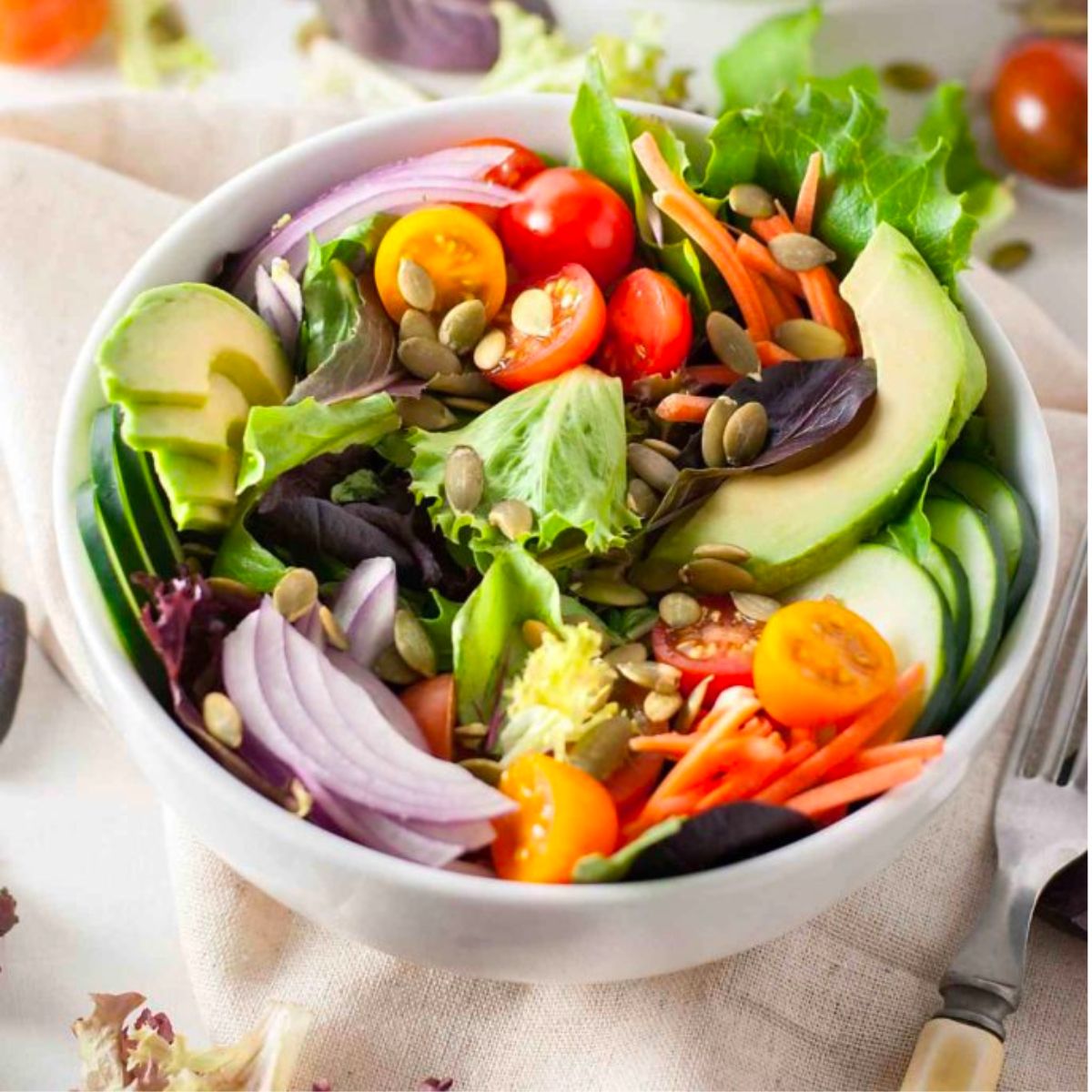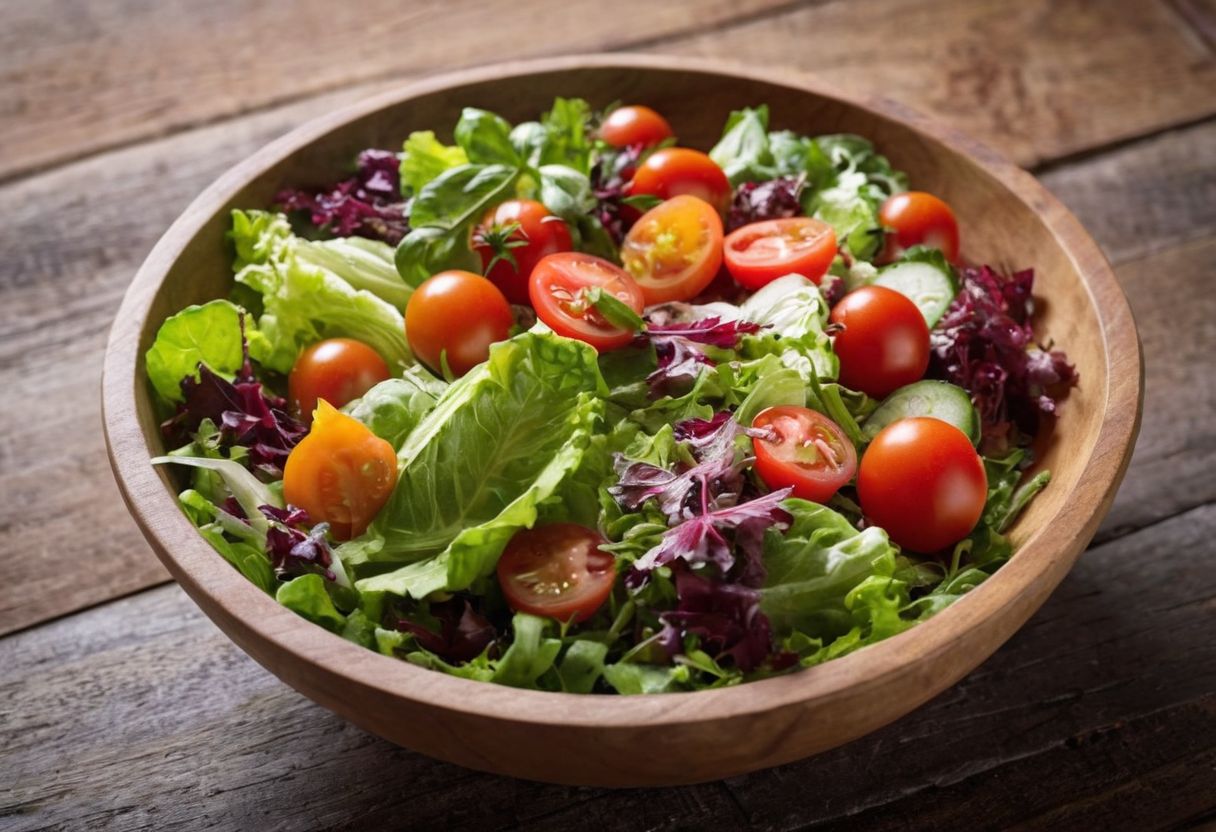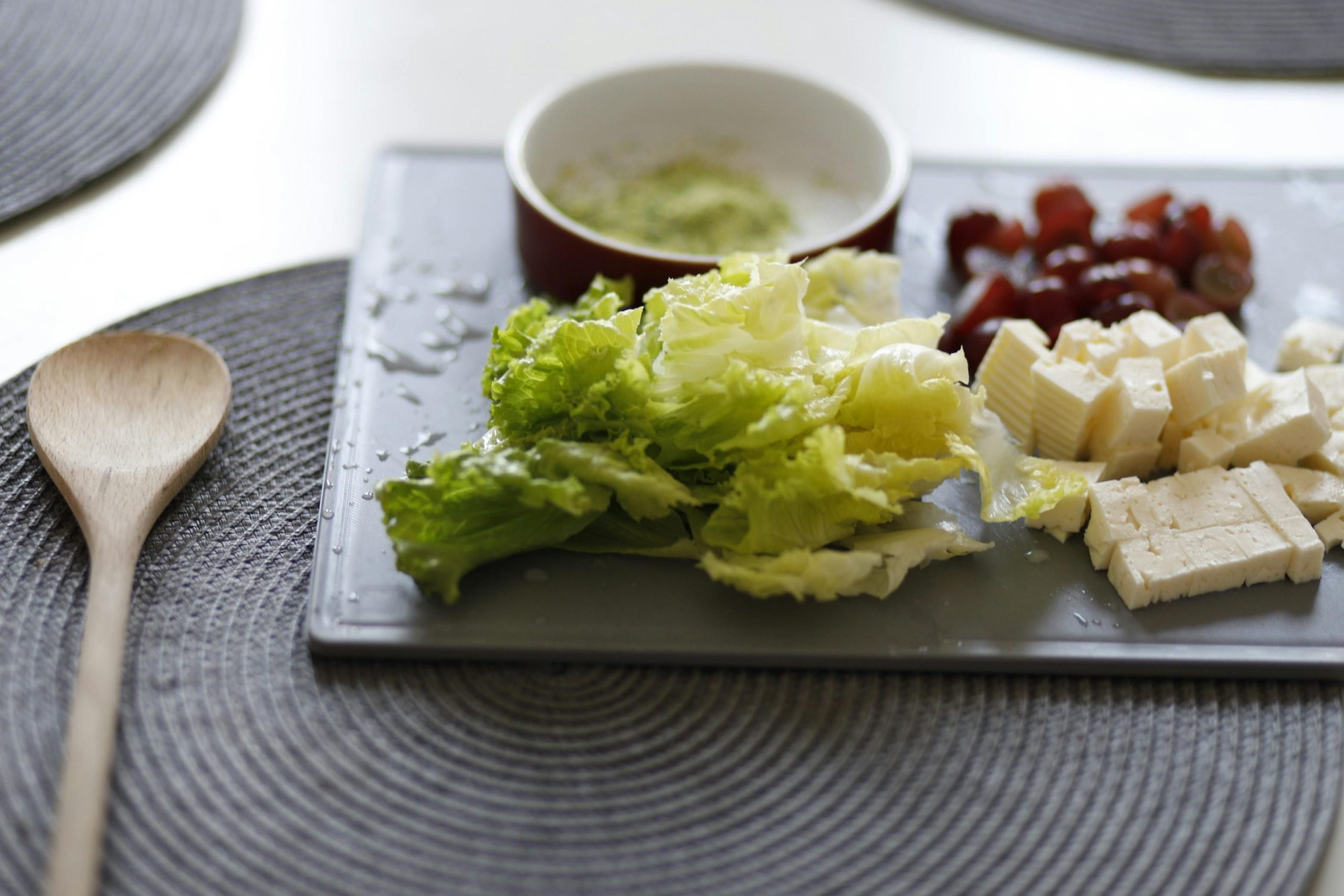Are you looking to refresh your meal routine with something vibrant and healthy?
Finding the right mix of flavor and nutrition in a meal can often be a challenge, especially if you’re aiming for plant-based options.
Plant-based salads are packed with nutrients and can be incredibly flavorful and filling, featuring ingredients like chickpeas, fresh vegetables, and a variety of dressings.
In this article, we’ll explore easy-to-make vegan salad recipes, the best dressings to enhance their taste, effective storage tips to keep them fresh, and how to further indulge in culinary delights with exclusive food tours.
Explore Easy Vegan Salad Recipes for Every Occasion

Embracing a plant-based diet doesn’t mean you have to settle for monotonous meals. The beauty of vegan salads lies in their versatility and the endless combinations of ingredients you can use. Whether it’s a light lunch or a substantial dinner, there’s a vegan salad for every occasion. For instance, a simple kale salad tossed with avocado, nuts, and a lemon dressing can be both refreshing and filling. On the other hand, a more robust Moroccan couscous salad loaded with roasted veggies and spices can serve as a satisfying meal on its own.
Experimenting with ingredients is key to keeping your vegan salads exciting. Consider these combinations for your next meal:
- Chickpea salad with cucumbers, cherry tomatoes, and a zesty vinaigrette for a protein-packed dish.
- Roasted sweet potato salad combined with black beans and red onions, dressed in a lime and cilantro dressing for a touch of zest.
- Cauliflower and quinoa salad with mixed leafy greens, peppers, and a tahini dressing, perfect for those seeking a hearty, plant-based protein meal. These combinations not only ensure a variety of textures and flavors but also boost the nutritional content of your meals.
The secret to a great vegan salad often lies in the dressing, which can transform simple ingredients into a culinary delight. A creamy avocado dressing can turn a basic green salad into a creamy treat, while a spicy tahini dressing can add a kick to grain-based salads. Remember, the best vegan salads are those that combine freshness, crunch, and a balance of flavors to keep your palate interested and your body nourished. So, grab your large bowl, and let’s start mixing up some delicious and nutritious vegan salads.
Best Dressings to Elevate Your Plant Based Salads

Dressings are the secret weapon in your culinary arsenal when it comes to elevating the taste of plant-based salads. A well-crafted dressing not only adds moisture but also infuses salads with bursts of flavor. For those who cherish a bit of zest, a simple lemon juice and extra virgin olive oil emulsion can work wonders. This classic combination is not only easy to whip up but also complements the natural flavors of greens and vegetables. To add a creamy texture without dairy, consider blending in some ripe avocado. Here are a few quick dressing ideas:
- Balsamic vinaigrette: Combine balsamic vinegar with olive oil, a touch of mustard, and a hint of maple syrup for sweetness.
- Herb-infused dressing: Mix your favorite herbs with virgin olive oil and a squeeze of lemon juice for a fresh, aromatic flavor.
- Spicy tahini dressing: Blend tahini with lemon juice, water to thin it out, and a dash of cayenne for some heat.
For those who enjoy a richer, more decadent dressing, consider the vegan caesar which utilizes cashews or silken tofu as a base, blended with capers, Dijon mustard, and a splash of lemon juice for tanginess. This dressing is robust and can turn a simple romaine salad into a hearty meal. Another exciting option is a sweet and tangy mango dressing, where pureed mango is mixed with lime juice and a hint of chili for some kick. These dressings not only add a layer of flavor but also enhance the nutritional profile of your salads, making them more satisfying and enjoyable. Remember, the key to a great salad dressing is balance — the right amount of fat, acid, and seasoning can transform your plant-based salads from good to spectacular.
How to Store Plant Based Salads Effectively

Storing plant-based salads effectively is crucial to maintaining their freshness and flavor. To start, always ensure that all ingredients are dry before storage, as excess moisture can lead to spoilage. For leafy greens, layering them with paper towels can help absorb any residual moisture, keeping them crisp and fresh. For salads containing multiple ingredients, consider storing components separately in airtight containers. This not only prevents flavor cross-contamination but also keeps textures intact. For example, store dressings separately and only add them when ready to serve. This approach is particularly important for ingredients that are moisture-sensitive or have a tendency to soften, such as avocados or tomatoes.
Choosing the right storage container is also vital. Opt for containers that are airtight to prevent the ingress of unwanted moisture and odors from other foods in the refrigerator. Here are a few additional tips:
- Use clear containers to easily identify the contents and keep track of what you have.
- Label containers with the date of storage to ensure you use the oldest ingredients first, reducing waste.
- Place heavier, moisture-resistant items like carrots or cucumbers at the bottom of the container, with lighter or more delicate items like lettuce or fresh herbs on top to prevent bruising. By following these simple yet effective storage tips, you can greatly extend the life of your plant-based salads, making them a convenient and healthy option for meals throughout the week.
Discover More Culinary Delights with INDULGE
After mastering the art of creating delightful plant-based salads, why not elevate your culinary journey by exploring more with INDULGE? Based in Zurich, INDULGE offers curated culinary tours that immerse you in the local and international food scenes. Imagine walking through the historic streets of Zurich West or the charming alleys of Old Town, guided by local experts like chefs and sommeliers. These tours not only introduce you to over 15 Swiss specialties but also provide insights into Zurich’s rich culinary history. For those who wish to dive deeper, INDULGE’s exclusive Wine & Dine experiences feature multiple courses paired with exquisite wines, showcasing the best of Zurich’s gastronomy. This is a perfect opportunity to:
- Experience the local culture through its food.
- Enjoy unique dining experiences that go beyond the typical restaurant visit.
- Learn from culinary experts about the techniques and history behind famous Swiss dishes.
If you’re looking to expand your culinary horizons after enjoying homemade vegan salads, INDULGE’s tours offer an unmatched gastronomic adventure. Each tour is designed to cater to different tastes and interests, whether you’re a tourist eager to explore Swiss cuisine or a local wanting to rediscover the culinary treasures of your city. From the industrial heart of Zurich to the traditional flavors of the Old Town, each experience is crafted to provide a deep understanding and appreciation of both Swiss and international cuisines. Here’s what sets INDULGE apart in making your culinary exploration unforgettable:
- Guided food tours led by local experts, offering a deep dive into Zurich’s food history and international cuisine.
- Signature walking tours in Old Town Zurich, introducing you to famous Swiss specialties.
- Wine & Dine experiences in Zurich’s industrial heart, featuring multiple courses paired with exquisite wines. By choosing INDULGE, you’re not just tasting food; you’re experiencing a story with every bite.
Frequently Asked Questions
What is the healthiest salad to eat everyday?
The healthiest salad to eat every day would be one that combines a variety of fresh vegetables, a good source of plant-based protein, and a healthy dressing. For instance, a salad made with kale, avocado, nuts, and a lemon dressing offers a mix of essential nutrients, healthy fats, and protein, making it both nourishing and fulfilling for daily consumption.
Can I eat cheese on a plant-based diet?
Traditional cheese, which is made from animal milk, is not included in a plant-based diet. However, there are many plant-based cheese alternatives made from nuts, seeds, or soy that can be enjoyed while following a plant-based diet.
Is Greek yogurt allowed on a plant-based diet?
Greek yogurt, which is made from dairy, is not typically included in a strictly plant-based diet. However, there are plant-based alternatives to Greek yogurt made from ingredients like coconut milk, almond milk, or soy, which can be suitable for those following a plant-based diet.







